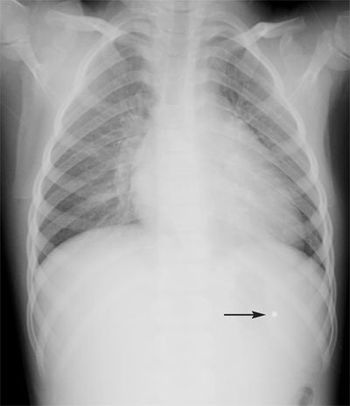
The infant who arrives for medical care after an apparent life-threatening event (ALTE) presents the pediatrician with a host of uncertainties

The infant who arrives for medical care after an apparent life-threatening event (ALTE) presents the pediatrician with a host of uncertainties

Adolescent and young adult patients need help with the process of transitioning to adult care, in which patients are more responsible for their own healthcare.

Journal research looks at elevated BP in children who snore, leading treatments for lice and cause of colic.

A collection of links for the most current, comprehensive information on H1N1.

An editorial that examines the current status of H1N1 in the medical setting.

Dr Bhagwan Das Bang received the Pediatric Hero Award at The American Academy of Pediatrics (AAP) National Conference & Exhibition (NCE) in Washington, DC today (October 20, 2009).

Timothy Culbert, MD, and Rebecca Kajander, MPH, CNP, nearly put the audience to sleep at their October 18th interactive workshop, “Replacing Pills with Skills.” But that was just what they had hoped would happen!The two staff members from the Integrative Medicine Program at Children’s Hospital and Clinics in Minneapolis demonstrated-and then had the audience practice-a variety of self-care techniques that can be taught to children to help them manage common health problems, such as pain, insomnia, anxiety, and nausea.

Attorney General Eric Holder made a surprise appearance at Monday morning’s (Oct. 19) plenary session to talk to attendees at this year’s AAP Convention about the problem of children’s exposure to violence – and what pediatricians can do about it. His impassioned speech was met with a standing ovation from the packed DC Convention Center ballroom.

As our legislators craft their bills, the media is feeding us a relentless diet of health care debate coverage. TV, newspapers and journals, and the blogosphere report and opine tirelessly on questions of whether there will be a public option, how much health care reform will cost, how it wilil be financed, and others.

Pediatricians on their way to Washington, DC, for the American Academy of Pediatrics (AAP) 2009 National Conference & Exhibition this weekend (October 17-20) will likely have both a sense of anticipation and some concern.

For the discerning pediatrician, choosing which sessions to attend at the American Academy of Pediatrics National Conference & Exhibition (AAP NCE) can be a daunting task. The editors of Consultant for Pediatricians have prepared a list of “must-see” sessions to help narrow down the selection process.

There are 2 major reasons to vaccinate your child.

Given the array of childhood disorders that can adversely affect the immune system, most pediatricians at some point will care for children who are immunodeficient.

Vaccines have saved more lives than any other single medical advance and are among the most important preventive tools available to clinicians.

A 5-year-old girl was brought to the emergency department after she was injured during a drive-by shooting. She had 5 small entry wounds: 2 in the arm, 2 in the buttocks, and 1 in the left torso. Radiographs confirmed that a piece of pellet had entered her upper torso but was not in the lung or causing any problem.

A review of three articles, about media exposure's link to increased BMI, a better test for tuberculosis, and how parents may be put off if you don't greet them properly.

Communities that use science-based approaches to problem behaviors in adolescents, including alcohol and tobacco use, are more likely to see positive results.

Profiles of a portable table, a pediatric gait trainer, and a software program that uses RFID tags to track nursery infants.

A 12-month-old awakens with asymptomatic juicy red papular eruptions on her cheeks. It is diagnosed as Gianotti-Crosti Syndrome.

Communities that use science-based approaches to problem behaviors in adolescents, including alcohol and tobacco use, are more likely to see positive results.

The tenth in a year-long series of commentary reviewing topics published in Contemporary Pediatrics 25 years ago. This month's article discusses the influence of TV on children and the AAP's current stance on the subject.

Profile of Charoltte Cowan, MD, a pediatrician who has written a series of children's books about common child maladies such as earaches and fevers.

Caring for lesbian, gay, bisexual, transgender, and questioning youth requires both an understanding of general adolescent cognitive and sexual health development, as well as an awareness of some of the unique medical and social issues these young people may face.

A year-old child with a jaundice and respiratory distress is eventually diagnosed with HIV.

An editorial that examines the prominence of pediatric metabolic syndrome over the last few years.

Dr. Andrew Schuman recently sat down with Dr. David Kaelber to discuss the implications of his vastly simplified screening tool for pediatric hypertension.

A collection of links for lesbian, gay, bisexual, transgender, and questioning youth, and their parents, friends, and doctors.

Letters about iron supplementation and testicular self-exam (TSE).

A short window of action exists for the newborn with suspected sepsis. With little time and less-than-perfect lab studies, are CRP values the added clue you need to arrive at a diagnosis?

CA and NY nurses seek H1N1 protection; nurse-doctor teamwork shown to save money; formation of national nursing union faces obstacles; nurses' Internet use studied